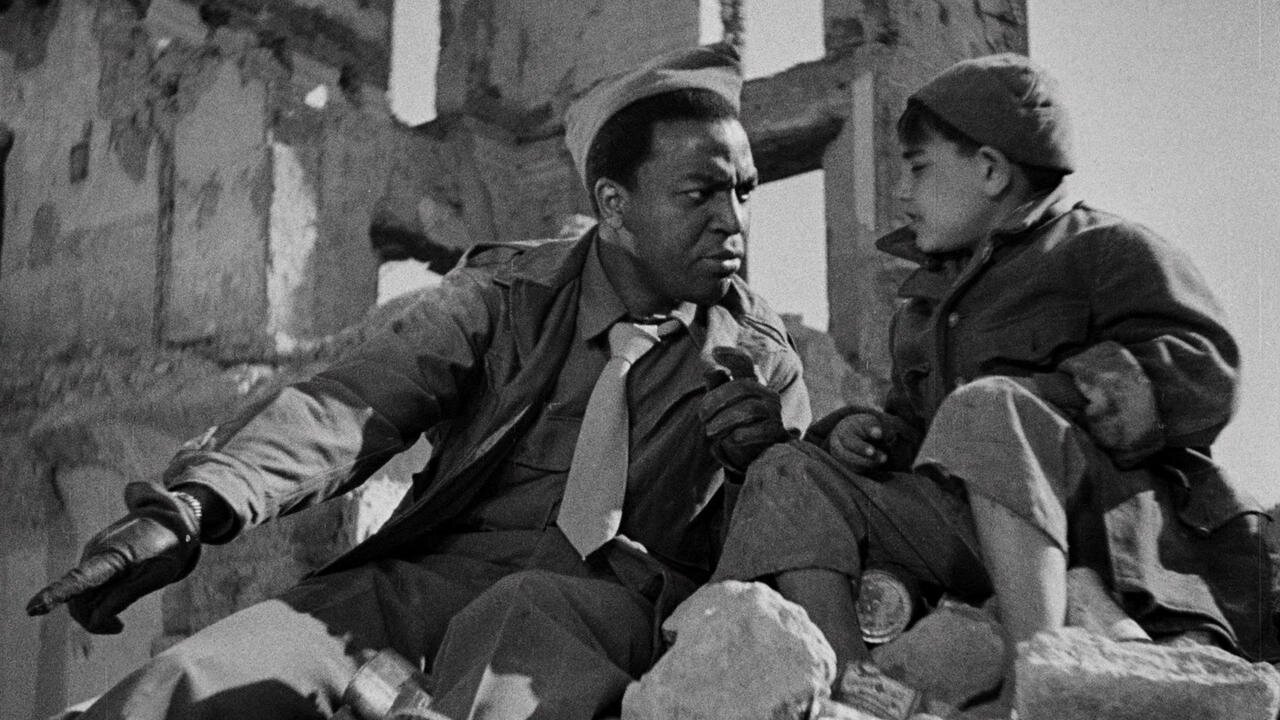 Image 1 of
Image 1 of


Paisà (1946)
![]()
Country: IT
Technical: bw 115m
Director: Roberto Rossellini
Cast: William Tubbs, Gar Moore, Maria Michi
Synopsis:
Six stories from the Italian campaign during World War II, enshrining examples of common humanity amid all the inhumanity: a girl avenges the death of a barely known GI and dies for it (Sicily); a black MP appreciates the reality behind the acts of theft and looting committed by gangs of small boys (Naples); a girl driven to prostitution meets again the soldier she welcomed as an innocent patriot upon liberation (Rome); partisans fight fascists in Florence and a young man and woman struggle across the city to find their loved ones; three American chaplains receive hospitality from Dominican friars suspicious of their religious orientation; and in the Po delta partisans and American soldiers surrounded by Germans fight for survival while attempting to lay signals for Allied aircraft.
Review:
The director's account of his country's road to freedom is understandably free of political zeal given Italy's embarrassing volte face at the time from Axis to Allied power; instead he emphasizes the universal bonds between men and women. The downside is in the thinness of some of the episodes and the poor dialogue and dubbing, particularly among foreign members of the cast (in the first section particularly the American soldiers are as garrulous as in any homegrown propaganda film, and the Florence episode has two British officers, guidebook in hand, assessing the situation from the comfort of the Pitti Palace gardens). The latter half is undoubtedly the more effective, the Florence and Po valley stories benefiting from some convincing exterior scenes in the neo-realist manner, and a real sense of history taking place before our eyes: poetry and immediacy.
![]()
Country: IT
Technical: bw 115m
Director: Roberto Rossellini
Cast: William Tubbs, Gar Moore, Maria Michi
Synopsis:
Six stories from the Italian campaign during World War II, enshrining examples of common humanity amid all the inhumanity: a girl avenges the death of a barely known GI and dies for it (Sicily); a black MP appreciates the reality behind the acts of theft and looting committed by gangs of small boys (Naples); a girl driven to prostitution meets again the soldier she welcomed as an innocent patriot upon liberation (Rome); partisans fight fascists in Florence and a young man and woman struggle across the city to find their loved ones; three American chaplains receive hospitality from Dominican friars suspicious of their religious orientation; and in the Po delta partisans and American soldiers surrounded by Germans fight for survival while attempting to lay signals for Allied aircraft.
Review:
The director's account of his country's road to freedom is understandably free of political zeal given Italy's embarrassing volte face at the time from Axis to Allied power; instead he emphasizes the universal bonds between men and women. The downside is in the thinness of some of the episodes and the poor dialogue and dubbing, particularly among foreign members of the cast (in the first section particularly the American soldiers are as garrulous as in any homegrown propaganda film, and the Florence episode has two British officers, guidebook in hand, assessing the situation from the comfort of the Pitti Palace gardens). The latter half is undoubtedly the more effective, the Florence and Po valley stories benefiting from some convincing exterior scenes in the neo-realist manner, and a real sense of history taking place before our eyes: poetry and immediacy.
![]()
Country: IT
Technical: bw 115m
Director: Roberto Rossellini
Cast: William Tubbs, Gar Moore, Maria Michi
Synopsis:
Six stories from the Italian campaign during World War II, enshrining examples of common humanity amid all the inhumanity: a girl avenges the death of a barely known GI and dies for it (Sicily); a black MP appreciates the reality behind the acts of theft and looting committed by gangs of small boys (Naples); a girl driven to prostitution meets again the soldier she welcomed as an innocent patriot upon liberation (Rome); partisans fight fascists in Florence and a young man and woman struggle across the city to find their loved ones; three American chaplains receive hospitality from Dominican friars suspicious of their religious orientation; and in the Po delta partisans and American soldiers surrounded by Germans fight for survival while attempting to lay signals for Allied aircraft.
Review:
The director's account of his country's road to freedom is understandably free of political zeal given Italy's embarrassing volte face at the time from Axis to Allied power; instead he emphasizes the universal bonds between men and women. The downside is in the thinness of some of the episodes and the poor dialogue and dubbing, particularly among foreign members of the cast (in the first section particularly the American soldiers are as garrulous as in any homegrown propaganda film, and the Florence episode has two British officers, guidebook in hand, assessing the situation from the comfort of the Pitti Palace gardens). The latter half is undoubtedly the more effective, the Florence and Po valley stories benefiting from some convincing exterior scenes in the neo-realist manner, and a real sense of history taking place before our eyes: poetry and immediacy.